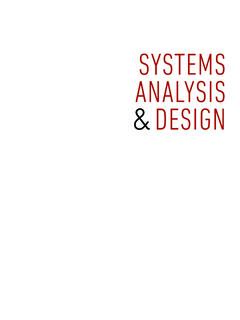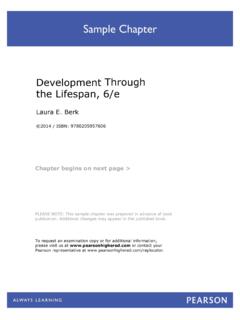Transcription of Origins and Evolution of American Policing - Pearson
1 Outline the emergence of state and federal law enforcement agencies. 3 Summarize various eras of Policing . 2 Outline the Origins of Policing . 1 Police offi cers and police activities receive intense scrutiny by everyone. Origins and Evolution of American Policing 1 Source: David R. Frazier Photolibrary, 111/17/11 4:17 PM11/17/11 4:17 PM2 Chapter 1 Origins and Evolution of American Policing In 2011, Harvard University s John F. Kennedy School of Government, in conjunction with the National Institute of Justice, released an important new publication entitled Police Science: Toward a New Paradigm. 1 The publi-cations authors, George Mason University Professor David Weisburd and Peter Neyroud, Chief Executive of the National Policing Improvement Agency in the United Kingdom, called for a radical reformation of the role of science in Policing .
2 Their purpose was to facilitate the start of a new era of evidence-based Policing . As we shall see in numerous places throughout this book, evidence-based Policing , which refers to the use of high-quality social science research to guide police practice, is rapidly becoming an important theme in twenty-first century law enforcement, and may be the most important innovation in Policing since Sir Robert Peel formed the world s first modern-day police force. Advance of science in Policing is essential, the Kennedy School authors wrote, if police are to retain public support and legitimacy. Unfortunately, however, the authors point out that evidence-based Policing is [still] not the rule today, and that science is [still] not an essential part of [today s] police world. Worse, say Weisburd and Neyround, today s police leaders have failed to take ownership of police science, allowing outside institutions to dictate the nature of Policing studies, and to produce findings that may not even be relevant to day-to-day enforcement operations.
3 Weisburd and Neyroud call upon police leaders to correct the situation by stepping up their use of science, and by familiarizing themselves with contemporary best practices in law enforcement agencies around the country and around the globe. It is essential, say the authors, to determine what Policing programs actually work, and to use that knowledge to become wise decision-makers when ask-ing for public moneys. Police Science: Toward a New Paradigm, is one of a series of articles in the Kennedy School s New Perspectives in Policing series, and is available on the Web at http:// . It was pub-lished as part of the Kennedy School s Executive Session on Policing and Public Safety, which met from 2008 to 2010. An older series consisting of 17 articles, published between 1988 and 1993, comprise the original Perspectives on Policing series, and are also available on the Web.
4 You can access them at . As you read through this text, you will learn more about evidence-based Policing (see a more formal definition of the term later in this chapter) and about its relevance to Policing in the twenty-first century. A good introduction to the applicability of the modern social sciences to Policing and to the field of criminal justice in general can be found in National Institute of Justice Director John Laub s Web-based video presentation entitled Embracing A Culture of Science, at . THE EMERGENCE OF EVIDENCE-BASED Policing INTRO Why do the authors featured here say that the advance of science in Policing is essential ? DISCUSS The Origins of Policing more thoroughly, is federal local law enforcement partner-ships, which some see as especially important in the fight against terrorism.
5 Critics of such efforts suggest that we are inching toward a national police force, a notion that, to the minds of many, is antithetical to our nation s system of government. History can repeat itself for the better when we revisit the successful strategies of the past. The decentralization that served Policing early on in our nation s history, for example, is now part and parcel of recent reforms in Policing around the country. From Private to Public Policing One of the earliest known methods of Policing , called kin Policing , involved families, clans, and tribes enforcing informal rules and customs. Each member of the group was given authority to enforce the established rules, and individuals who deviated from For students of Policing , an appreciation of history is essential in order to understand the contemporary structure of law enforcement in the United States today.
6 As a result of histori-cal circumstances, the American system of Policing is nearly unique in the world. Most countries today rely on one or only a few agencies for law enforcement. In the United States, how-ever, there are thousands of law enforcement agencies with hundreds of thousands of employees. No other country has a Policing system that looks quite like ours. The study of Policing history is important for another rea-son: For better or for worse, history often repeats itself. History repeats itself for worse when policy makers make decisions in a vacuum, without regard for those who have faced the same problems before. In other words, the failure to appreciate what was once tried without success leads to a costly repetition of past mistakes. Some critics of recent changes in American Policing , such as the shift toward community Policing , for example, argue that what we are now doing signals a return to days of old, which may not be desirable.
7 Alternatively, a technique or program that looks totally innovative and desirable today may have been purposefully avoided in the past. An example, which we will later cover The American system of Policing is nearly unique in the world. 211/17/11 4:17 PM11/17/11 4:17 PM3 The Origins of Policing In England, the Second Statute of Westminster (1285)7required that each parish appoint two Their duties were to inspect the arms of the parish and to assist the sher-iff with law enforcement. Men over the age of 15 formed the posse comitatus , which assisted with the pursuit and capture of dangerous criminals. Magistrates, who eventually came to be known as justices of the peace , began to be appointed by the king or the sheriff around the thirteenth century. They had primary responsibility for adjudicating crimes, not unlike modern-day judges.
8 In England, from which we derive many of our tradi-tions, this was the predominant model of law enforcement until the nineteenth century. What set early approaches to Policing apart from modern Policing practices is that most of the officials charged with enforcing laws were volunteers. If paid, they were not salaried as police officers are today. Sheriffs, for example, were allowed to appropriate a portion of the money collected in the king s name. 9 Even though these developments signaled a shift from private to public Policing , much of the job of enforcing the law remained largely private; there simply were not enough public officials to do the job. As the years passed, though, Policing took ever greater steps in the direction of becoming a govern-mental function. One of the most significant steps toward fully public polic-ing occurred in 1735, when two London parishes were given authority to pay their watchmen out of tax collections.
9 10 Then, toward the middle of the eighteenth century, John and Henry Fielding , two Bow Street magistrates, started to pay men to serve as constables and patrol the streets at night. 11 These Bow Street Runners , or thief takers , patrolled the city on foot and the surrounding areas on horseback. They also performed investigations, and for that reason they have been described as the first known detective In 1800, the Thames River Police were paid by public mon-eys. 13 Private police forces did not disappear, however. Outside London in more rural areas, much law enforcement was still the responsibility of churches, communities, parishes, magistrates, and a variety of other individuals. Moving beyond England, other countries also started to form public police agencies. France, Prussia (Germany), Russia, China, and India all made the gradual shift from private to public law A s police officers came to be paid with public funds, the shift away from private Policing became more apparent.
10 The Influence of the English Model To a large extent, Policing in London became the model for Policing in America. Historians have called attention to various forces behind the emergence of American Policing , several of which we will consider shortly, but what early American Policing looked like stemmed a great deal from the English approach. In 1822, British home secretary Sir Robert Peel criticized the state of Policing in London. Some years later, he was responsi-ble for passage of the Act for Improving the Police in and Near the Metropolis, other-wise known as the Metropolitan Police Act . community norms were often dealt with This method of Policing changed during the rise of the Greek city -states and the Roman Empire, and law enforcement evolved from what was essentially a private affair to a public one.















